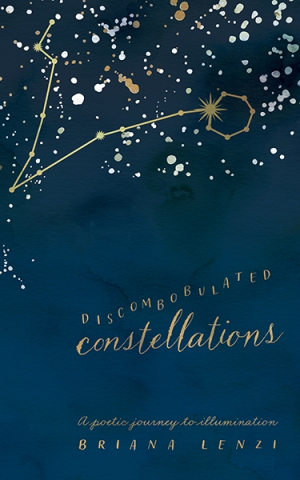Discombobulated Constellations
A Poetic Journey to Illumination
The vibrant poems collected in Discombobulated Constellations meditate on whole realms of the human experience.
Briana Lenzi’s punchy poetry collection Discombobulated Constellations meditates on the natures of grief and love, relaying wise messages in accessible form.
Organized into four sections—Loss, Lone, Light, Love—these poems muse on death, companionship, and redemption. The poems in the first section dance around the topic of a mother’s death, filled with imagery of tears, sobs, reaching for a departed loved one. “Care” reflects: “You have taught me / Everything. / So much / Except for / How to do this.”
Some poems are long, spanning multiple pages, while others are quite short. “Lost” contains just four lines: “I have / So many people / But none of them / Are you.” Still, it reveals a depth of mourning in its symmetry of syllables, with its short, long, long, and short lines punctuating its loneliness.
The poems in Lone and Light celebrate womanhood, valorizing goddesses and encouraging meek women to find their voices. Multiple poems invoke warrior goddesses, asking them to embrace their own power and shed the patriarchal judgments keeping them tamed and chained. And “Stars” claims that the stars themselves are disorganized and chaotic: “Disheveled specks of light, / [are] Thrown across a black / And hollow canvas,” but “Nobody complains / About / The discombobulated / Constellations.” The final section, Love, explores abundance and vulnerability, both through the experience of taking a lover, and as a general assertion that love can change people if they let it.
In terms of form and language, the poems trend toward simplicity, utilizing direct language and short lines to let the empty spaces on their pages speak. Similes appear often, as in the poem “Feral”: “Her eyes burn like embers” and “Her hips shake like rattles.” Rhyme appears in some poems, often in alternating lines, as in “Rise,” one of the many invocations to the divine and maligned feminine: “They hunted you down. / Your power they craved. / And NOW is the time / The witch will be saved.” One of the more intriguing formal experiments appears in “Validation,” a poem that can be read from first line to last, or vice versa.
Major themes of the collection include living and dying, shucking gender norms and social norms, and embracing vulnerability as key to authentic self-knowledge. Water motifs persist: in “Soft,” a lover’s story is “Floating in words,” while in “Tears,” salty tears “drown” the narrator. Both gentle and fierce, these poems articulate a vision of unabashed self-love as a path toward healing and full humanity.
The vibrant poems collected in Discombobulated Constellations meditate on whole realms of the human experience, including losing a parent and falling in love.
Reviewed by
Jeana Jorgensen
Disclosure: This article is not an endorsement, but a review. The publisher of this book provided free copies of the book and paid a small fee to have their book reviewed by a professional reviewer. Foreword Reviews and Clarion Reviews make no guarantee that the publisher will receive a positive review. Foreword Magazine, Inc. is disclosing this in accordance with the Federal Trade Commission’s 16 CFR, Part 255.

